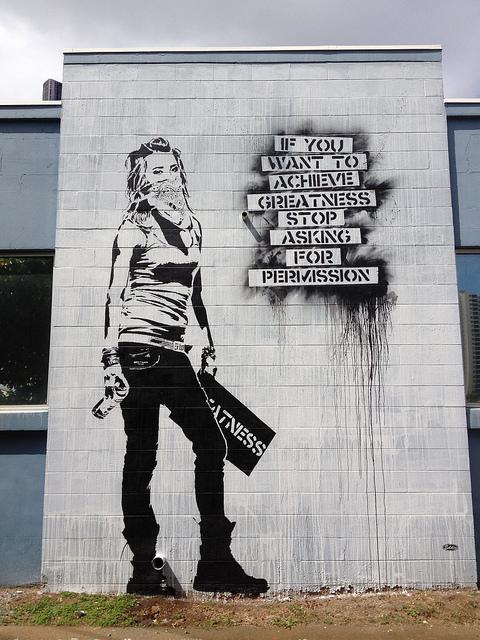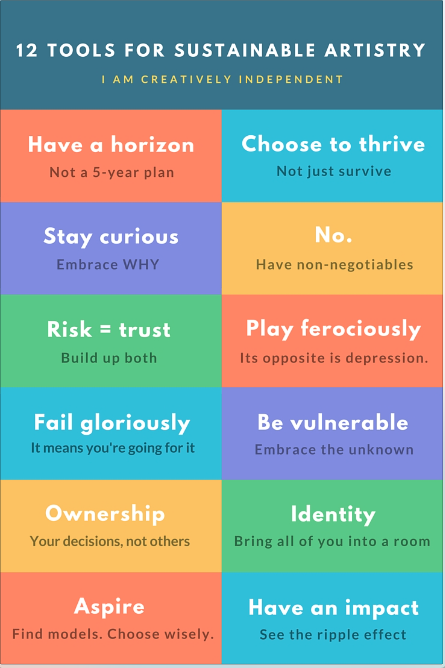An Outside Eye
Is it feedback or permission?
This series explores sustainable artistry by breaking down the starving artist myths and giving mindful support for blazing your own flexible, dependable path. Join the revolution of artists and educators unsatisfied with day-to-day surviving and hell-bent on everyday thriving in that improvisational space called an artful life. Have a topic or question for a future post? Drop me a line @creativelyindie.
Artists may at times create in solitude, but they don’t work in a vacuum. They are influenced by the world around them, by their lineage, by their dreams. Artists devise inside a whirligig of time where past, present, and future fuse together and then splinter apart.
With all those choices—which aren’t always conscious—it is easy to find yourself disoriented or even lost. In those moments of uncertainty, what do you do? Often, we ask for perspective from an outside eye.
If you need permission, plug into speakers that support your vision, not ones that deny it. If you want feedback, ask clearly with the intimacy of those that will send the energy back for you to interpret.
Wait! In that moment of “who-am-I-where-am-I-what-have-I-been-working-on?!” make sure you clearly answer two key questions:
- Who am I asking?
- Why this person specifically?
If you don’t, you run the risk of watering down your identity and losing sight of your horizon. The person you ask to frame this perceived chaos you’ve created has their own intention and identity. They have their own fears and levels of success and failure. They have unspoken—and often unconscious—motivators that color their critique.
And you thought you were disoriented before you asked their opinion…? Whoa nelly! No wonder so many students walk out of programs without clear points of views and opinions. Critiques are subjective, so are grades, but the power teachers have to pass or fail their students is not. So instead of navigating the subjective landscape with their own compass, students survive by doing what they’re told.
That’s not artistry. That’s mimicry.
You, rock star, are an artist. Own it, by owning who you bring into your process, when, why, and with how much weight.

Feedback vs. Permission
Imagine you’re performing on stage. You send out your creation, the audience sends the energy back to the source—you—which then influences how you send then perform in the next moment. That’s feedback: artistically and scientifically.
Feedback can be negative, positive, or uninformative, and it will heavily influence how you create the next moment. Liz Lerman, author of “Critical Response Process”, says, “Good feedback is the kind that makes you want to go back to work. You cannot wait to get back into the studio.” This doesn’t come by luck. This comes from understanding what you want feedback on, who you’re asking, and why.
Now, let’s add a microphone. The speaker it’s attached to needs to be pointing out, like you, to amplify the energy. The speaker is the permission you gave yourself to speak louder, reach further, and engage more people in your message.
When you ask for feedback from someone who’s denying permission—or asking for permission from someone giving you feedback—you’re turning the speaker towards yourself. Every done that? It’s acoustic feedback and it’s excruciating. It is a never-ending loop of asking for and being denied permission that only stops if you (a) turn your volume down, (b) unplug the speaker, or (c) use a speaker facing out.
I’ve seen far too many students and artists choose (a), which is heart breaking. Don’t water down your point of view. If you need permission, plug into speakers that support your vision, not ones that deny it. If you want feedback, ask clearly with the intimacy of those that will send the energy back for you to interpret.
My husband and I recently made that mistake during our Kickstarter campaign for a new book we’re writing on creative ownership with Shakespeare. We decided to make our first crowdfunding adventure playful, like us, and invite people to the party. Every Friday, for an extra incentive we create custom physical comedy and combat videos for funders. It’s insanely fun, creating dozens of impromptu moments during the day to say thank you.
A friend wrote us commenting that we were nuts. In that moment, we heard the feedback as permission. We felt judged, like this was impossible. And in a split-second, we went from elated to deflated. How could one comment from a peer shut us down so fast?
Turns out, after some self-observation work, we hadn’t given ourselves permission to ask for money. Not fully. There was still shame attached. Once we gave ourselves full permission to have fun getting funding, the same comment was heard as feedback.
We are nuts. It’s an insane task creating all those videos with hourly turnarounds. But it’s a perfect example of our process: high-stakes, collaboration, vulnerability, play, risk.
When You Need it, Be Clear.
It’s fine to ask for feedback or permission. Just be clear about it.
How? Ask:
Am I asking how my choices are affecting them (feedback)?
or
Am I asking if I’ve made the right choices (permission)?
Permission is the allowance to move forward into the unknown. The urge to ask for permission is embedded in us, trained as children to ask permission for anything from basic needs (being excused from class for the bathroom) to new territories (hanging out at a new friend’s house).
So, if you need it, get it. But get it from someone who’s already given it to themselves. Don’t ask for permission to get political in your plays from someone who shies away from politics at dinner.
Getting permission doesn’t have to be verbal or even in person, either. The models you choose to inform your life can give that permission by simply being. Just this year we lost many prime examples of strong permission-givers from Bowie to Prince.
How you live and create is giving others permission too, without you even knowing it.

Keep going, because deep down, the one you need to ask for feedback and permission is you.
Create your work. Sit with it. Breathe in how you feel and see where you are with these twelve tools.
Start here. Understand yourself, even just a little, here. Then see who you want to ask for feedback or permission.
Be honest on why. Then go for it.
Actively participate in the life you’re creating.


Comments
The article is just the start of the conversation—we want to know what you think about this subject, too! HowlRound is a space for knowledge-sharing, and we welcome spirited, thoughtful, and on-topic dialogue. Find our full comments policy here